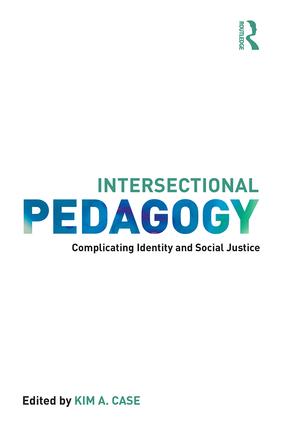Select an item by clicking its checkbox


Intersectional Pedagogy: Complicating Identity and Social Justice, 1st Edition
Additional Info:
Intersectional Pedagogy explores best practices for effective teaching and learning about intersections of identity as informed by intersectional theory. Formatted in three easy-to-follow sections, this collection explores the pedagogy of intersectionality to address lived experiences that result from privileged and oppressed identities. After an initial overview of intersectional foundations and theory, the collection offers classroom strategies and approaches for teaching and learning about intersectionality and social justice. With contributions from scholars in education, psychology, sociology and women’s studies, Intersectional Pedagogy include a range of disciplinary perspectives and evidence-based pedagogy. (From the Publisher)
Table Of Content:
Forward
Acknowledgements
Ch 1. Toward an Intersectional Pedagogy Model: Engaged Learning for Social Justice (Kim A. Case)
Part I Intersectional Theory and Foundations
Ch 2. Intersectionality Foundations and Disciplinary Adaptations: Highways and Byways (Ronnie Michelle Greenwood)
Ch 3. Decolonial Intersectionality: Implications for Theory, Research, and Pedagogy (Tuğçe Kurtiş and Glenn Adams)
Part II Intersectionality & Classroom Applications
Ch 4. Undoing the Psychology of Gender: Intersectional Feminism and Social Science (Patrick R. Grzanka)
Ch 5. Infusing Intersectionality: Complicating the Psychology of Women Course (Kim A. Case and Desdamona Rios)
Ch 6. Pedagogical Practice and Teaching Intersectionality Intersectionally (Nancy Naples)
Ch 7. Teaching Intersectional Psychology in Racially Diverse Settings (Kim A. Case and Michelle K. Lewis)
Ch 8. Quotes, Blogs, Diagrams, and Counter-Storytelling: Teaching Intersectionality at a Minority-Serving Institution (Naomi M. Hall)
Part III Intersectional Pedagogy for Social Justice
Ch 9. Revealing Hidden Intersections of Gender Identity, Sexual Orientation, Race, and Ethnicity: Teaching about Multiple Oppressed Identities (David P. Rivera)
Ch 10. Decentering Student "Uniqueness" in Lessons about Intersectionality (Desdamona Rios, Matthew J. Bowling, and Jacquelyn Harris)
Ch 11. Experiential Activities for Engaging Intersectionality in Social Justice Pedagogy (Adrienne Dessel and Timothy Corvidae )
List of Contributors
Index
Intersectional Pedagogy explores best practices for effective teaching and learning about intersections of identity as informed by intersectional theory. Formatted in three easy-to-follow sections, this collection explores the pedagogy of intersectionality to address lived experiences that result from privileged and oppressed identities. After an initial overview of intersectional foundations and theory, the collection offers classroom strategies and approaches for teaching and learning about intersectionality and social justice. With contributions from scholars in education, psychology, sociology and women’s studies, Intersectional Pedagogy include a range of disciplinary perspectives and evidence-based pedagogy. (From the Publisher)
Table Of Content:
Forward
Acknowledgements
Ch 1. Toward an Intersectional Pedagogy Model: Engaged Learning for Social Justice (Kim A. Case)
Part I Intersectional Theory and Foundations
Ch 2. Intersectionality Foundations and Disciplinary Adaptations: Highways and Byways (Ronnie Michelle Greenwood)
Ch 3. Decolonial Intersectionality: Implications for Theory, Research, and Pedagogy (Tuğçe Kurtiş and Glenn Adams)
Part II Intersectionality & Classroom Applications
Ch 4. Undoing the Psychology of Gender: Intersectional Feminism and Social Science (Patrick R. Grzanka)
Ch 5. Infusing Intersectionality: Complicating the Psychology of Women Course (Kim A. Case and Desdamona Rios)
Ch 6. Pedagogical Practice and Teaching Intersectionality Intersectionally (Nancy Naples)
Ch 7. Teaching Intersectional Psychology in Racially Diverse Settings (Kim A. Case and Michelle K. Lewis)
Ch 8. Quotes, Blogs, Diagrams, and Counter-Storytelling: Teaching Intersectionality at a Minority-Serving Institution (Naomi M. Hall)
Part III Intersectional Pedagogy for Social Justice
Ch 9. Revealing Hidden Intersections of Gender Identity, Sexual Orientation, Race, and Ethnicity: Teaching about Multiple Oppressed Identities (David P. Rivera)
Ch 10. Decentering Student "Uniqueness" in Lessons about Intersectionality (Desdamona Rios, Matthew J. Bowling, and Jacquelyn Harris)
Ch 11. Experiential Activities for Engaging Intersectionality in Social Justice Pedagogy (Adrienne Dessel and Timothy Corvidae )
List of Contributors
Index